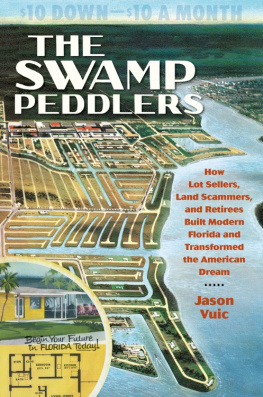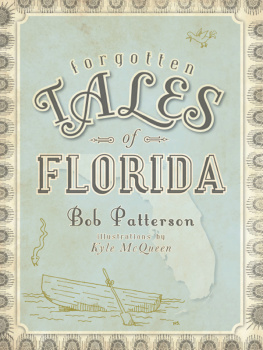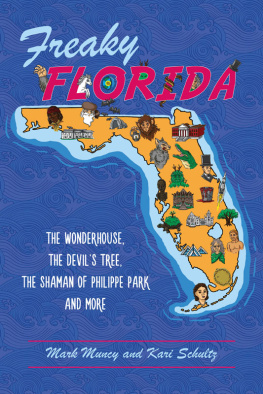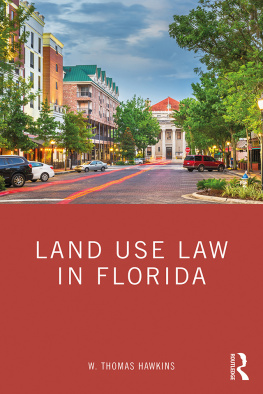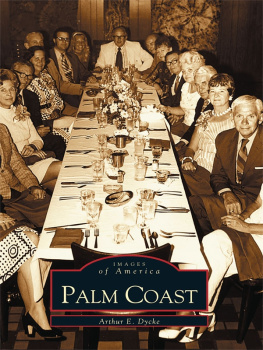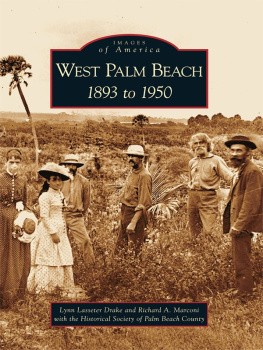[Florida has] a glorious tradition of hawking itself as shamelessly and profitably as is humanly possible. If someone sells you swampland, its because someone sold swampland to their fathers, and perhaps even to their grandfathers before that. Maybe its in our blood, or maybe its just something in the water, but it is part of our heritage.
Introduction
The Swamp Peddlers
[In Florida] the future belonged to an eclectic collection of hucksters and boosters, risk takers and fortune makers who saw retirement communities and instant cities where others saw sand and swamp.
GARY R. MORMINO, Land of Sunshine, State of Dreams
Tough, stylish, sophisticated, in 1970 the talented Elizabeth Whitney was an award-winning journalist and the lone female news editor at the St. Petersburg Times. She covered real estate, having worked her way up, as a thirtyish single mother, from what she called the female tract of food, fashion, and church reporting to what in those days was the male-only tract of business. But Whitney knew what she was doing. She had edited a large student newspaper as a college undergraduate, and her father had developed the 3,700-acre Ridge Manor community north of Tampa. It was her familys business. Lot sales, home sales, tax assessments, downtown redevelopment projects, suburban planned communities, retirement communities, and even nursing homes: these were her bailiwick, and Whitney covered property-related topics with aplomb, winning best article awards from at least a half dozen entities, including Florida Realtor magazine, the National Association of Real Estate Boards, and the Florida Womens Press Club, among others.
In early 1970, with the encouragement of her boss, Donald K. Baldwin, the president and chief editor of the Times, Whitney set out to win a Pulitzer, of all things, after she attended a meeting in Tampa of a state agency known as the Florida Land Sales Board (FLSB). Its job was to regulate what had to have been, apart from pollutive phosphate mining, the states seediest industry: the high-pressure sale of homesites and raw, unimproved acreage sight unseen to tourists, foreigners, soldiers stationed abroad, and northernersyour quintessential swamp peddling. People had done it for decades, of course, perhaps even a century or more, but things kicked into a higher gear following World War II, when three developer-brothers from MiamiElliott, Robert, and Frank Macklepopularized an entirely new model of land sales by hawking lots in planned communities in Floridas southern and central flatwoods on the installment plan, for $10 down and $10 a month.
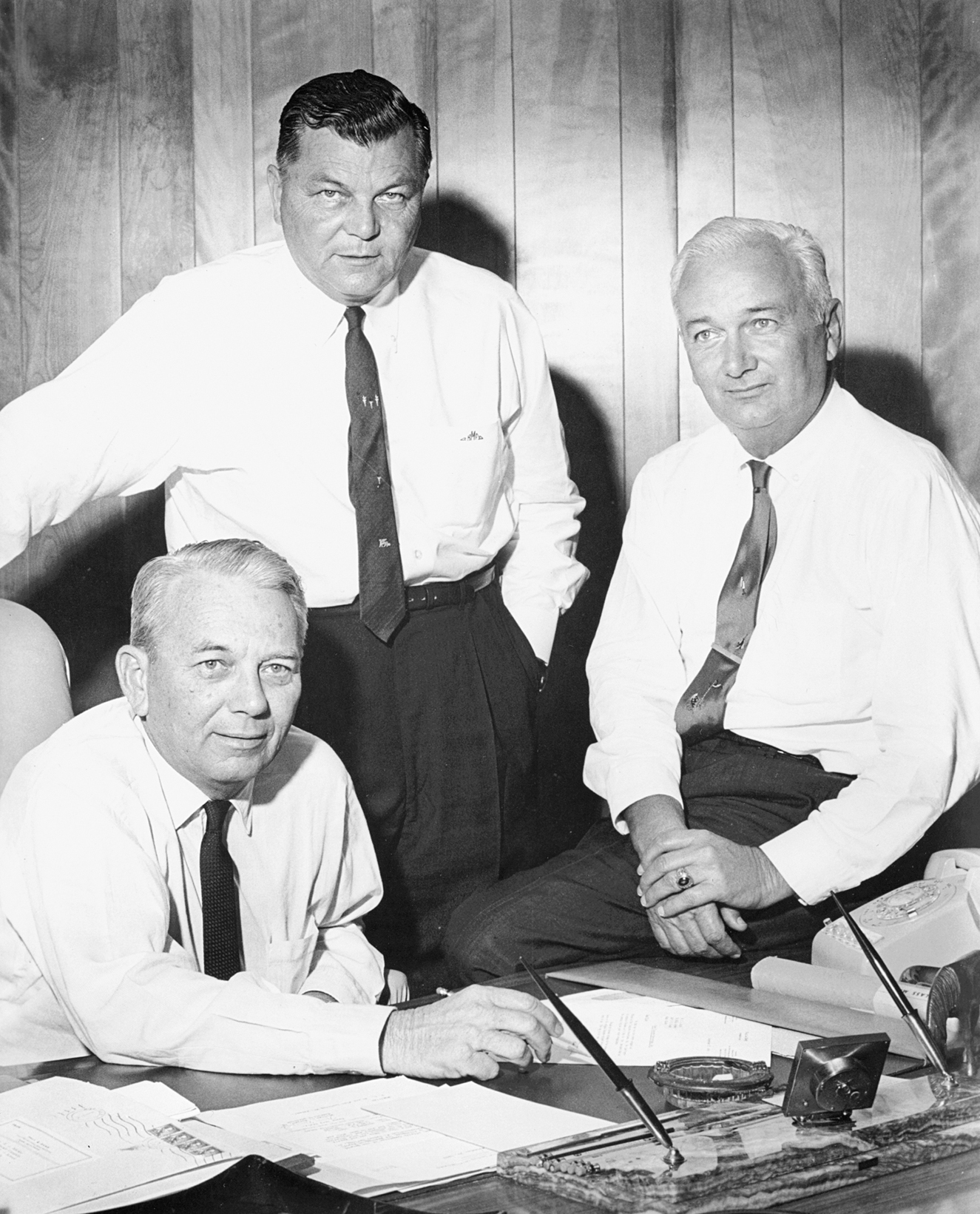
Seen here circa 1970, the Miami-based Mackle brothers (left to right, Elliott, Robert, and Frank Jr.) revolutionized the sale of homesites in Florida by offering customers easy-to-pay, $10 down, $10-a-month installment plans instead of mortgages. Courtesy of Marco Island Historical Society.
As Whitney knew, the Mackles were honest brokers; they only sold buildable homesites in perhaps a dozen large communities, but the billion-dollar industry they created, the so-called installment land sales industry that came and went in the brief period between 1955 and 1975, spawned hundreds of competitors who sliced and diced and ultimately sold the state one lot at a time. They ranged from publicly traded land giantsmassive corporations headquartered in Miami that owned hundreds of thousands of acres and built entire communities from scratch, including Port Charlotte, Port St. Lucie, Port Malabar, Cape Coral, North Port, Golden Gate, Deltona, Marco Island, Rotonda, Lehigh Acres, and Spring Hill, among othersto fly-by-night and sometimes fraudulent entities selling forty-nine lots or less.
These so-called forty-niners, Whitney learned, were shady lot-sales operations that deliberately sold fewer than fifty parcels a year, the minimum required by the FLSB for both registration and the disclosure of property reports, which told buyers whether or not the parcel they were purchasing was, for example, seasonally inaccessible or located in a swamp. Yet, even for bigger companies, the sale of swampland was legal. And Whitney found that despite property reports which had disclaimers written in red that blared THIS LAND IS SUBJECT TO PERIODIC FLOODING or THIS LAND HAS NO PHYSICAL OR LEGAL ACCESS, buyers couldnt be protected from themselves. They didnt read the reports or had been sweet-talked by a professional salesman at a call center in Miami or by one of the 600 or so compatriots sitting in cubicles in at least thirteen different centers citywide who made some 4.5 million unsolicited sales calls each year.
Whitney couldnt believe it. She, like everyone else, had figured swamp peddling was a thing of the past, a relic of the 1920s when Florida had its last great boom. But she stopped short when she heard an FLSB official exclaim that the sale of unusable land should be illegal. It wasnt illegal? Whitney asked, incredulously. That seemed impossible, but as she looked into the story and dug through the agencys files, she found that for Floridas installment land sales industry, the marketing of swampland as something other than swampland was par for the course. The Mackles didnt do it, focusing instead on selling high and dry homesites in drab but still functional communities such as Spring Hill and Deltona, but other land giants, including the states biggest developer of all, the Gulf American Corporation and its successor company, GAC Properties, did.

